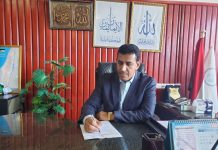Marshal Mahdi al-Mashat, President of the Supreme Political Council in the Council of Ministers, on Monday inaugurated the Code of Professional Conduct and Work Ethics in Public Service Units.
President al-Mashat directed to adopt the code and start of its implementation by the concerned authorities and take the necessary measures to monitor its implementation as one of the criteria for functional and institutional evaluation.
President al-Mashat thanked the administrative sector and all those in charge of this code of conduct, especially the Ministry of Civil Service, for their efforts in bringing out the code to represent the first achievements of the plans for 1444 AH.
He stressed the importance of the code of conduct, which comes within the framework of everyone’s keenness and quest for the advancement and outstanding performance of the man of responsibility.
Al-Mashat confirmed the need to deal with the code with an understanding and diligence as it represents principles, provisions, controls and values that should be given the attention of all officials and everyone who belongs to the career corps in the state.
President al-Mashat clarified that there will be an evaluation for all parties of the extent of commitment to the code and procedures to control those who violate it, as well as a continuous evaluation of discipline in accordance with the Code of Job Conduct, as the Ministry of Civil Service will play this role, urging the rest of the sectors to bring their programs to the level of implementation as the sector did Administrator and began to launch its programs successively.
He pointed out that the code is the beginning of reform, because reform begins with the soul and reality and reforming work begins with reforming souls.
He said, “From here comes the paramount importance of completing the code of functional conduct, because it comes in the context of our keenness to reform ourselves all, to then be included in the plans according to the decision.
President Al-Mashat pointed out that this code is one of the steps that will follow and the programs that will be announced and launched successively in the context of implementing the plans for the year 1444 AH, stressing that the most important thing to implement the code is its application by everyone.
He said, “We followed up on the completion of the code of conduct in the context of our awareness of the responsibility of the honorable medal that the Messenger, may God bless him and his family, granted us in his saying, “Faith is Yemen and wisdom is Yemeni.” We look at what we have of an honorable history and an ancient civilization.”
He added, “When we look back at our history and look at our civilization, we see that it is our duty and responsibility to create a present that is in harmony with the history and civilization of our people, and with the words of our Prophet, prayers be upon him and his family, “Faith is Yemeni and wisdom is Yemeni” and here comes the role of the behavioral code.”
President al-Mashat clarified that many people interested in politics and the media are wondering about the political developments and the foggy situation of the armistice, and we assure them that the current situation of the armistice is a time bomb, since we are neither in a truce nor at war.
He pointed out that the foggy situation is the result of recent developments, as some parties to the aggression countries reached that they are convinced they are losers from this aggression and not a winner, and they need to think more, and reconsider more, and we support them in this direction.
He said, “We are threatened with re-aggression at any time, and this is a possible thing. It means that we are in front of parties that benefit from the aggression against our country and are not affected, and they are now pushing towards the explosion of the situation at the military and political levels, and the failure of the truce, and here comes the malicious and dangerous role of the American who does not want to renew the truce, while pretending in the media that it is a dove of peace, while it is a trumpet and a bad owl, and when it heads to the region we must look at it as a bad owl, and not as it declares that it is heading to the region in the interest of peace.
President al-Mashat stated that in the previous visit, things had reached a level of good understanding, until this American owl named the American envoy came to the region and thwarted these efforts, and this is briefly a summary of the political situation.
He stressed that the launch of the Code of Conduct and Work Ethics in the Public Service Units embodies pride in the faith identity and enhances the course of correcting the performance of state institutions and their career cadres at various levels.
He pointed out that this code is a binding code of honor consisting of a set of principles, values, and behavioral, ethical and professional rules, which correct the general concept of employment as a responsibility to serve people in the first place, and view it as a sacred, ethical, religious, value and human view.
At the conclusion of his speech, President a-Mashat expressed his thanks for all the efforts made by everyone who participated in preparing the code in the context of the transformation witnessed by state-building in various aspects.
Prime Minister Abdulaziz bin Habtoor pointed to the nature of the unique human experience provided by the Islamic state since its establishment by the Holy Prophet Mohammed, may God bless him and his family and companions, and which continued for many centuries.
Bin Habtoor stressed the need for a correct dealing of the various problems, including the administrative side, indicating that the government will work during the current and future period to confront all the imbalances and issues that need to be addressed.
For his part, director of the Office of the Presidency of the Republic, Head of the Administrative Sector, Ahmed Hamed, stressed the importance of this event in which the administrative sector launches the Code of Job Conduct and Work Ethics in Public Service Units, after a long and diligent work.
He said, “the Code of Employment Conduct, as much as it is a revolutionary entitlement and a popular demand, and an action called for by the leadership and directed by it more than once, is at the same time a foundation we rely on, and a gateway through which we cross towards comprehensive reform, starting with the person in the position of responsibility, which is the main axis In the administrative process and institutional reform, which, if it is right, life becomes right, institutions are reformed, and many problems are addressed through it, and the work is straightened, and the fields of work and the fields of responsibility are transformed into a sanctuary of worship in which faith values, virtuous morals, good dealings and responsible performance, in which we see the truth, are embodied, the responsibility is honesty.”
Hamed indicated that it is the values and principles that will transcend the human being and elevate him and make him an upright person and a good element in himself, his directions, his plans and his actions, and good in fulfilling his responsibilities.
He added, “The job is a service, and service in a position of responsibility is lofty values, whose great title is mercy, whose foundation is dignity, honesty and piety, and its goal is justice and fairness, and its motto is cooperation, loyalty, teamwork, and exhortation to truth.
Hamed explained that the Code of Conduct represents a real and effective guarantee for improving performance and job discipline, improving communication mechanisms, providing quality services, and creating an environment that repels corruption levels, and through controls in dealing with public money and public property, anti-corruption controls, dealing with complaints and dealing with media, data and information technology.
He stressed the need to comprehend the code well, sign it in all institutions, set work mechanisms for its implementation, and interact with the civil service regarding the forms, pointing out that this code is general for all institutions.
Hamed urged the continuation and determination to implement the administrative sector plan and bring it down to practical reality, pointing out that after this launch of the code, the institutional performance evaluation project, and the related guides, models and training, will be launched, leading to the completion of the rest of the work, with the aim of moving from planning and work.
He stressed that the aggression and siege will not be able to hinder or stop this national ambition or affect public awareness.. He said, “No matter how much the aggression misleads and slanders, and no matter how much it tries with its horns to reduce such actions, as is its habit in front of every achievement, and in the face of any progress, all his miserable attempts will only increase our awareness, our steadfastness, and our firm belief in the correctness of movement, the impact and value of what we are in, and the importance of what we offer.



















